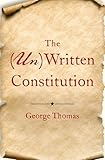The (un) Written Constitution / George Thomas.
Publisher: New York, NY : Oxford University Press, [2021]Description: pages cmContent type:- text
- unmediated
- volume
- 9780197555972
- Unwritten constitution
- 342.73001 THO 23
- KF4550 .T46 2021
| Item type | Current library | Shelving location | Call number | Materials specified | Status | Barcode | |
|---|---|---|---|---|---|---|---|
 BOOKs
BOOKs
|
National Law School | General Stacks | 342.73001 THO (Browse shelf(Opens below)) | HB | Available | 38628 |
Browsing National Law School shelves,Shelving location: General Stacks Close shelf browser (Hides shelf browser)

|

|

|

|

|

|

|
||
| 342.6802 COR Albie Sachs and Transformation in South Africa : | 342.73 COL Engines Of Liberty : | 342.73 DOR Constitutional law stories / | 342.73001 THO The (un) Written Constitution / | 342.73009 BAL Principles Matter : | 342.7302 WHI Constitutional Interpretation : | 342.73042 SUT Who Decides : |
Table of Contents
Introduction: Interpreting a Written Constitution;
Chapter 1 Text and Textualism;
Chapter 2 Text and Originalism;
Chapter 3 Text and Republican Government;
Chapter 4 Text and the Separation of Powers;
Chapter 5 Text and Unwritten Understandings;
Conclusion: The Inescapability of Constitutional Judgment;
Notes;
Index
t.
"The late Justice Scalia relished pointing to departures from text as departures from the Constitution, but in fact his jurisprudence relied on unwritten ideas. As textualism has become more prominent with the elevation of Justices Gorsuch and Kavanaugh to the Supreme Court-jurists in the mold of Scalia-it is crucial to reveal the unwritten ideas that drive textualist readings of the Constitution. Our deepest debates about America's written Constitution are not about constitutional text, but about the unwritten ideas and understandings that guide our reading of text. This fact is obscured by the public understanding of textualism and originalism as put forward by its most prominent judicial advocates. The (Un)Written Constitution makes these ideas visible by turning to the practices of Supreme Court justices and political actors in interpreting the Constitution over more than two centuries. From founding debates about freedom of speech and religion to contemporary arguments about judicial review, the separation of powers, same-sex marriage, and partisan gerrymandering, this work highlights the too often unacknowledged ideas that animate our debates about the written Constitution. Contrary to textual jurists, these recurrent debates are not about whether to follow the text; they are disputes about what fidelity to the text requires. How do we weigh and balance different textual provisions and see them as part of a constitutional whole? The text does not answer such questions. This book illustrates that moving beyond the text is an inescapable feature of interpreting America's written Constitution"-- Provided by publisher.
There are no comments on this title.
